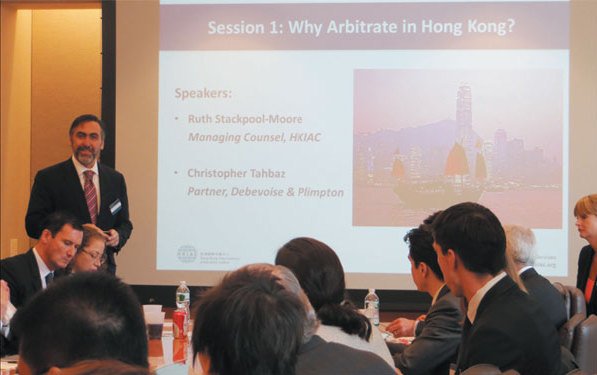Hong Kong is a leading venue for international arbitration
If you look closely at a map of Asia, Hong Kong is at the center. Not only that, but 50 percent of the world's population lives within a five-hour flight of the city, and less than a half-hour drive from the international airport is a center that helps settle international disputes.
"Whoever you're likely to be doing business with, chances are it's going to be quite convenient for them to go to Hong Kong," Ruth Stackpool-Moore, managing counsel for the Hong Kong International Arbitration Centre (HKIAC), said during a symposium in New York yesterday, highlighting Hong Kong's position as a leading arbitral venue.
The symposium was organized by the independent non-profit HKIAC, which was established in 1985 by a group of businesspeople and professionals to meet the growing need for arbitral services in Asia. Speakers came from Herbert Smith Freehills commercial law firm, HKIAC, Debevoise & Plimpton business law firm, Transammonia global trading group, and Rosensteel Law.
"I think it's fair to say that Hong Kong stands out as a premiere seat for international arbitration," Christopher Tahbaz, partner at Debevoise & Plimpton, said during his presentation.
|
Christopher Tahbaz of Debevoise & Plimpton business law firm spoke to a group of industry professionals interested in learning about Hong Kong as an arbitral venue. Caroline Berg / China Daily |
Arbitration is a form of alternative dispute resolution and is typically used for commercial disputes, particularly for international commercial transactions. It is used for the resolution of disputes outside the courts and involves a third party to review evidence in the case and impose a decision - the "award" - that is legally binding for both sides and enforceable.
The group of experts discussed the maturing arbitration infrastructure in Asia and why Hong Kong is a good arbitration venue, highlighting its advantageous legal position in respect to the Chinese mainland, its pro-arbitration framework and culture and recent key revisions to the Administered Arbitration Rules.
"There's a very substantial pool of professionals, experts and practitioners based in Hong Kong that makes it a very easy place to do this kind of work," Stackpool-Moore said.
HKIAC handled 456 disputes in 2012, of which 68 percent were international and 32 percent were domestic. The total amount in dispute for administered cases was about $1.8 billion. The arbitration cases involved 38 percent maritime, 27 percent commercial, 24 percent construction, 8 percent corporate and 3 percent insurance.
"We've got a huge number of new cases every year, which demonstrates the confidence that people have in arbitration in Hong Kong," Stackpool-Moore said. "One of our strongest features is we have a consistent and ongoing relationship with Chinese parties."
Stackpool-Moore said about 40 percent of HKIAC's arbitration cases involve at least one Chinese party.
In its 2012 annual report, HKIAC said Chinese parties are the No 1 users of its five-year-old Administered Arbitration Rules, followed by Singapore, India, South Korea, the British Virgin Islands and the US.
"It is a modern arbitration law," Tahbaz said. "It's a very user friendly, comprehensive, and actually quite flexible [law]."
Many developments for Hong Kong in the world of arbitration have occurred over recent years, according to a report published in the Asian-Mena Counsel Journal. In 2011, the highly anticipated Arbitration Ordinance was introduced to further modernize Hong Kong's arbitration services. Tahbaz said, "It is potentially a very powerful provision."



















